‘Fake meat’ sales rising as Wall Street investors predict long-term move away from traditional meat
Australian supermarkets and restaurants have found consumers can’t get enough of ‘fake meat’ made from wheat and pea protein with reports suggesting sales could hit $US104 billion or 10 per cent of the global market within a decade.
Fake meat made from wheat and pea protein has made a sizzling impact in Sydney with predictions it will one day push cuts of real beef off dinner plates and barbecue grills.
Coles began stocking the new Beyond Meat line last month and has already had to ship in more supplies from the US to keep up with demand while the Grill’d burger chain introduced a Beyond Meat menu in April and says it has surpassed all sales expectations.
“It has come a long way in the past few years and it now has a real meat like feel and texture to it. It is selling very well,” Coles spokesman Craig Little said.
He said Coles started stocking synthetic meat after research showed people wanted to reduce their real meat consumption.
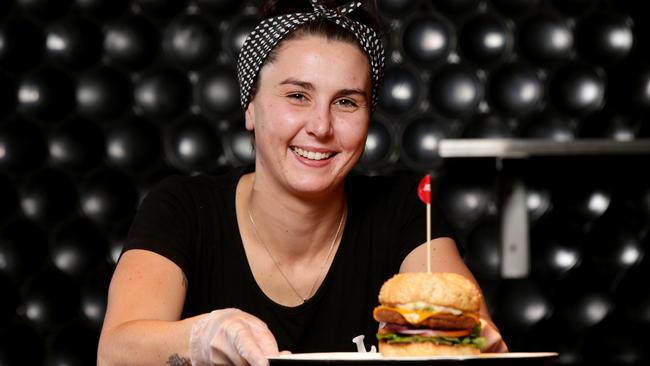
MORE NEWS
How safe is the food you feed your pet?
Boy George fans aged 40-60 busted with drugs
Nationals party return with three times focus on women
Manager of Grill’d Neutral Bay Georgina Brooder said reaction to the fake burger was “amazing”.
“In just a few months it has almost taken over the real meat burgers and they’re getting more popular every day,” she said.
Australia is a target market for Beyond Meat whose shares have rocketed 600 per cent since listing on Wall Street in May as investors bet on a long-term move away from traditional meat in the modern diet.
Analysts are forecasting plant-based meat could have a similar impact on traditional beef, lamb and pork sales as plant-based milks, made from nut and soy, have had on dairy.
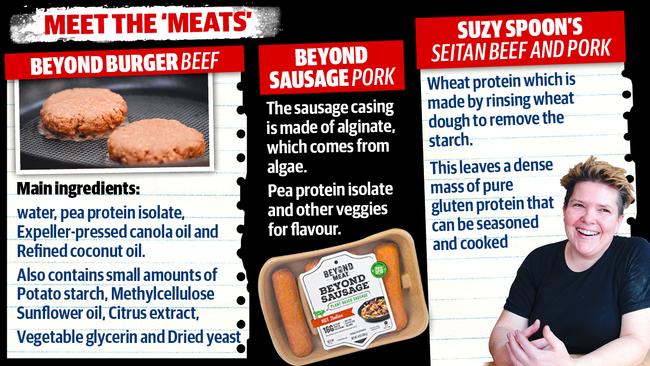
A Barclays Bank report suggests fake meat sales could hit $US140 billion, or 10 per cent of the global market, within a decade.
Beyond Meat patties, which are made from water, pea protein, canola oil and refined coconut oil, sell for $48.46 per kilo which is significantly more expensive than a $17 a kilo beef rump cut but cheaper than a prime grass fed beef fillet which goes for $52 per kilo.
Woolworths has also recorded success with its synthetic line of Funky Fields Plant Based Mince popular with shoppers.
“We work hard to keep up with the changing needs of our customers, and have seen more and more shoppers looking to incorporate vegetarian or vegan-friendly options into their weekly diets,” a spokesman said.
“This demand has driven double digit growth for plant-based meat alternatives in our stores over the past year.”
Sydney vegetarian butcher Suzy Spoon said it would not be long until fake meat replaced the real deal.
“We will have to find alternatives to find the massive population we have,” Ms Spoon said.
“Traditional meat is going to end up very expensive and will be a sometimes food for some people but you won’t be able to have traditional meat for breakfast lunch and dinner.”
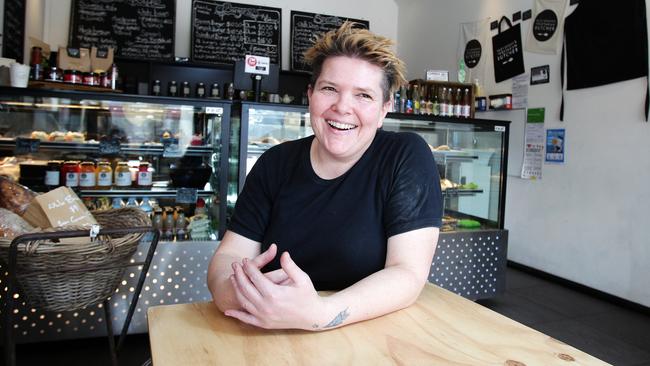
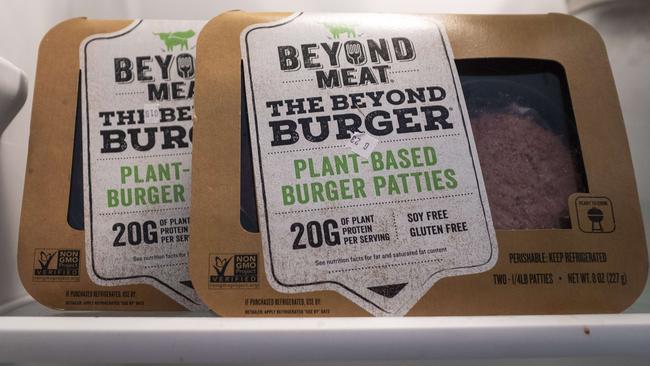
However, not everyone is completely sold on the new alternative meat products with one scientist saying clever marketing did not necessarily mean the fake meat was healthier.
In fact, it was a highly processed food.
“It’s easy to be misled by the marketing,” University of Newcastle molecular nutritionist Dr Emma Beckett told The Daily Telegraph.
“They say a product is plant-based, because it is a texturised vegetable protein, but really, once you do all that processing to turn the vegetable into the fake meat form, you’re not getting the same nutritional benefits as just eating the vegetable in its original form.
“They add saturated fats like coconut oil in a lot of these fake meats to make it more similar to real meat. Which means from a health point of view you also get some of the downsides too,” she said.
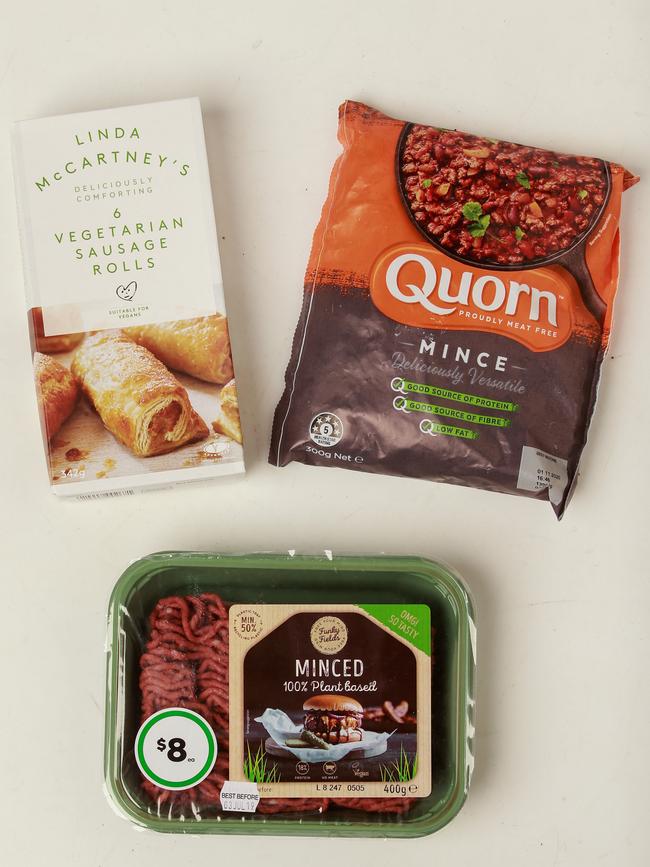
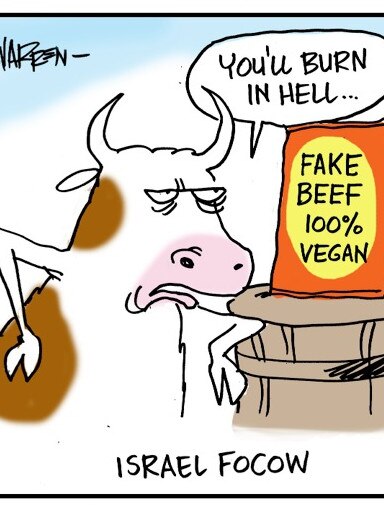
She added just because the burger is plant-based should not fool consumers into thinking fast food was suddenly healthy.
“There are all kinds of other meat alternatives, large burger chains have vegan burgers that are more plant-based, but it’s still fast food, it doesn’t become a health food just because it’s plant-based,” she said.
“From a nutritional point of view it really does mimic animal meat, for the good and the bad — they have the same saturated fat content as normal meat.”
Cattle Council of Australia president Tony Hegarty, who farms at Cassilis in the Central West of NSW, said consumers could be assured that eating red meat was an ethical way to source their protein.
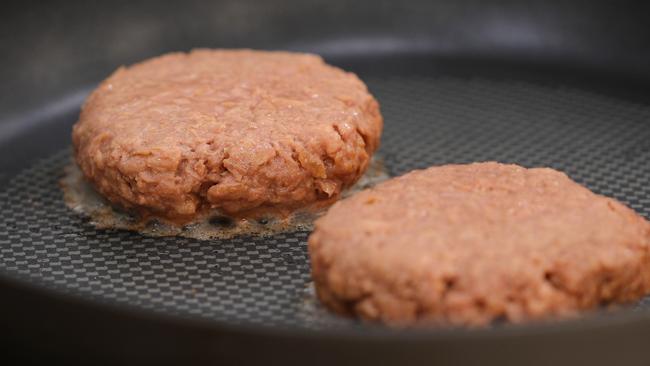
“Families raising livestock manage half of Australia’s landmass and our livelihoods depend on environmental sustainability because without healthy soil, water and air our grazing businesses don’t exist,” he said.
“Australia’s red-meat industry is on track to reduce our paddock-to-plate carbon footprint to zero by 2030. For anyone looking for a clean, green, ethical protein source which supports regional communities and environmental sustainability, nothing matches Australian red meat.”


